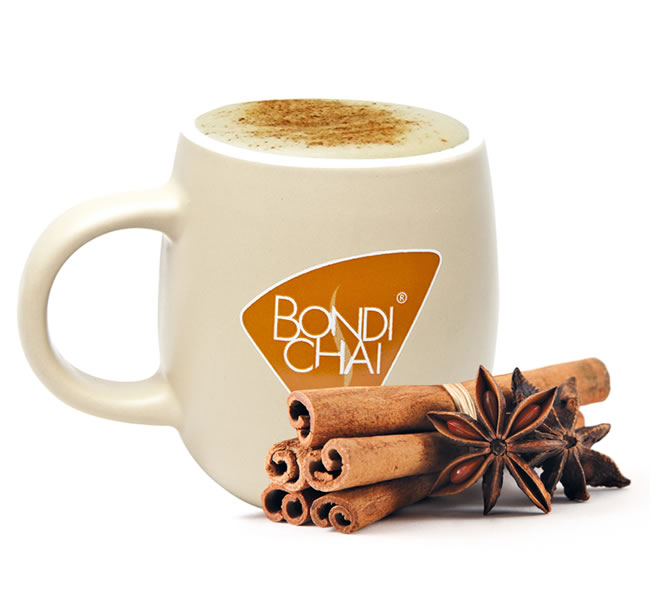Australia, your chai is ready! Stewart Dawes taps into Bondi Chai owner MARTIN BUGGY about the growing acceptance of chai around the nation, and where his brand fits into the picture…
Not sure if it’s the company I’ve been keeping lately, but I seem to have been drinking a lot of chai. Went to the Yoga Expo and drank some chai. Went to a friend’s afternoon tea, and chai was in the pot.
Ended up at the Mind Body Spirit festival, and drank even more chai. And then, supposedly non-coincidentally, I’m in email-touch with a chai company who send a batch of chai for me to taste. Their name? Bondi Chai. Where are they from? Er … Salamander Bay.
“We wanted a name that reflected the café lifestyle of fun, sun and good times and there’s no better known icon of that genre anywhere in Australia than Bondi Beach,” says Martin Buggy when we caught up at Naggy’s Cafe in Glebe.
“We also aim to take our product overseas – especially into South-East Asia where we’ve already had interest – and we wanted the quintessential Australian name to carry us into those markets. Ask any Japanese person where Bondi is … and add all that to the fact that Bondi Chai just sounds good and rolls nicely off the tongue and we knew we had the name.”
 While I’ve obviously ditched my hard-drinking journo friends recently for the soft holistic types who I’ve been meeting at yoga expos, I must admit to having been quite a novice in the chai-imbibing arena. I might have been a bit of a hippy in the past, but my aspirations were definitely middle-class – the move to Sydney pre-Olympics being a defining moment in the last dozen years of my life. But chai had always looked pretty feral to me, a perception Mr Buggy has brazenly tackled with the promotion of the “chai latte”, a smooth silky café-oriented beverage if ever there was one!
While I’ve obviously ditched my hard-drinking journo friends recently for the soft holistic types who I’ve been meeting at yoga expos, I must admit to having been quite a novice in the chai-imbibing arena. I might have been a bit of a hippy in the past, but my aspirations were definitely middle-class – the move to Sydney pre-Olympics being a defining moment in the last dozen years of my life. But chai had always looked pretty feral to me, a perception Mr Buggy has brazenly tackled with the promotion of the “chai latte”, a smooth silky café-oriented beverage if ever there was one!
“We believe we’ve uncovered a latent desire in Australians, and the Australian café scene, for a warm, frothy drink with a great taste and silky smooth mouth-feel,” Martin says as we down our first mug of it – by sheer coincidence, it happens to be on the menu at Naggy’s!
“Chai latte is probably the first genuinely new offering that cafes have
been able to give their customers in decades.”
All About The Flavour
Bondi Chai’s main two varieties, “Club Cinnamon” and “Vanilla Honey” do a lot to challenge the myths about what chai is by virtue of their names alone.
“Club” sounds like something exclusive, evoking images of sultry nights where the cocktails taste better thanks to an afternoon prep chai-latte-style.
Vanilla Honey sounds like one of James Bond’s mistresses, so is this VH more for the girls?
“We blended Vanilla Honey as an entry level chai latte,” Mr Buggy admits, “it’s a milder, less spiced version for those unused to chai tea. We find that people often begin drinking our VH and then graduate to Club Cinnamon after a few weeks.
“You’ll also find that other chai sellers in this country – the vast majority of them imported from the USA – have done a similar thing, but usually they use the names “spice” and “traditional”. But we found these terms to be useless in a market that doesn’t even know what the word chai means, much less what its traditional taste might be.
“We’ve found that there are so many variations of chai in India that it’s
difficult to describe what might be a traditional flavour anyway. We also shied away from the term ‘spice’ for the confusion it could cause – “do you mean spice as in curry – in a latte! Yuck! – or spice as in egg custard or a sweet cinnamon bun?
“Vanilla Honey more closely describes the characterising ingredients in the taste profile while Club Cinnamon aims to convey the strength of the cinnamon flavour – which is enhanced by anise, not used in the VH.”
When Style has a Health Factor
“We opted out of natural flavorings because of the health and quality implications,” Buggy continues. “I’m not sure if you’re familiar with where cinnamon or clove comes from, but we’ve seen these spices harvested and processed in Zanzibar and, trust me, you would not want to eat cinnamon again if you saw what happens to it before it goes into a packet. Spices are regarded as the ‘dirtiest’ food products available on the market and are required to be irradiated before import into the USA.
“The look of cinnamon dust floating around in your beautiful latte froth is also not good! And the quality of natural spices varies from season to season and with the time of year. For all those reasons we instead went for nature identical spices (clove, anise, cinnamon) which are derived from the essential oils of the natural ingredient – all the flavour with none of the above issues – some of which are imported from Germany because unfortunately we can’t source them in Australia.
“We also wanted to create a product with the simplest, closest to natural ingredients list we could manufacture. We believe Bondi Chai has the least number of ingredients in a chai latte anywhere – there are no chemical additives, anti-caking agents, anti-oxidising agents, preservatives, and so on.
“We have one ‘number’ – 150C – on our ingredients list which is the caramel colouring used and we’re currently investigating both its replacement and gluten-free status.”
From Focus-Groups To Financials
“We were able to develop our two taste profiles with extensive focus group testings and we know that 98% of people who taste our product like it enough to buy it – parting with money being the ultimate test,” says Buggy matter-of-factly.
“We’ve proved that stat so many times now we can quote it without fear of contradiction – we regularly attend food shows – our next will be the Good Food and Wine Show in Melbourne in June – where we sample out to thousands of people so we know first-hand how people react. In fact, even we were surprised at first at the extent to which our product was not just accepted but actively sought after.”
This has been great news for the domestic consumer, who can pick up a handy 250g bag of Club Cinnamon, take it home and within minutes of opening the carton of milk or soy, be drinking a piping hot ultra-smooth glass of this truly delectable product. But what about any food’s ultimate litmus test: the hard-nosed café or restaurant owner?
“Too many coffee shops we’ve spoken with are using what we believe to be wrongly formulated chai offerings – they’re too traditional or spicy and have largely been formulated in other countries where palates are obviously different to those here in Oz,” says Mr Buggy, who clearly has an answer to everything!
“The result is that we speak with some café owners who say: “I’ve had a bottle of that stuff here for months – no-one buys it” or “it doesn’t sell mate, we’ve got this powder here and people buy one but they don’t come back”.
“Our response is always: don’t throw the baby out with the bathwater – try ours, promote it properly – we give plenty of sales support – and we’ll give you your money back if you haven’t sold it in the first month.
“The result is that we’ve sold to more than 1200 cafes around Australia and have not yet had a request for a refund!”
The Hard Sell on the Soft Stuff
“Properly promoted, we’re seeing Bondi Chai adding the equivalent amount of up to 15% of gross coffee sales to cafes’ cash registers each week. Put in hard cash terms, a coffee shop doing 20kg of beans a week can expect to sell at least 2kg of Bondi Chai a week which is 200 serves at an average of $4 a serve which puts $800 into the till on top of coffee revenue as Bondi Chai does not cannibalise coffee income. We don’t know of any café that would knock that back!”
And the Big Picture?
Given the public’s permanent passion for ‘new’ things, does Mr Buggy believe cafes have a real opportunity to ‘spice up’ their overall sales by promoting this product as the next big thing in non-alcoholic leisure-time bevies?
“The fact that big coffee and tea consumer brands are now launching supermarket brands of chai latte speaks volumes about where this product is headed,” Buggy reveals. “But chai’s greatest virtue – its subtle complexity – is also its greatest vice in that the slightest tweak to the recipe creates big differences in taste. One person’s chai can definitely be another person’s poison.
“That’s why tastings are such an important part of our marketing and, luckily for us, why one taste of Bondi Chai is usually all it takes to convert curiosity into something approximating addiction.”
To order Bondi Chai for your cafe, bar or restaurant (or even for your home) click on their website or contact them via the below details:
Orders & Product Info Ph: 1300 764 299
International Distributor Enquiries Ph: +61 414 341 719
Email: sales@bondichai.com.au
Website: www.bondichai.com.au



